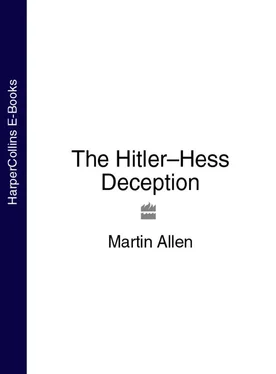1 ...7 8 9 11 12 13 ...21 Rudolf Hess’s character was one that naturally instilled confidence. He was an unassuming man, frequently called ‘the conscience of the Party’, who annoyed his fellow top Nazis – ever attired in uniforms glittering with medals and bedecked with swastika armbands – by calmly going about his work in earnest fashion, often arriving at the Reich Chancellery dressed in a sports jacket, or neatly tailored suit. The image of the brown-shirt-wearing Hess standing at his Führer’s shoulder and screaming ‘ Sieg Heil! ’ was for public consumption. In private he was a very different man indeed. After the war, a close acquaintance of Hess’s, Ernst Bohle, the former head of the Auslandsorganisation, * was asked whether Hess was a sincere Nazi. After mulling the question over for a few moments, Bohle replied: ‘He was sincere as an idealist, in my opinion the biggest idealist we have had in Germany, a man of very soft nature, no uniforms with him or that sort of stuff, [and] he very seldom went into the public field.’ 20
Hess was therefore an earnest politician, content to toil behind the scenes for the advancement of National Socialism, and in many ways he quickly became the all-round acceptable face of Nazi government.
Importantly, the high regard in which Hess was held in the 1930s was not limited to Germany. Politicians and Foreign Office officials in many other European countries, including Britain, saw him as a moderating influence within National Socialism. Hess was viewed as a reliable, solid politician, a man who did not drink, lived modestly, had a model family life, and, most important of all, was a safe pair of hands. This last sentiment, particularly in light of the surprising level of disorganisation in the Nazi administration, placed Hess in a particularly strong position not only within government, but also with Adolf Hitler.
When Hitler became Chancellor in 1933, he quickly found that his long-sought position was an all-consuming task that affected his ability to interact with the party. He therefore appointed his trusted friend Rudolf Hess as Deputy-Führer of the Nazi Party, with the responsibility of leading the party as his direct representative. Hess proved so successful an administrator that within eight months, on Hitler’s proposal, the elderly German head of state President Hindenburg appointed Hess to the position of Reich Minister without Portfolio in 1934.
Despite the ambiguity of this title, defined as ‘a Minister without an office or papers of state’, and the fact that his role during the 1930s has been largely overlooked, Hess’s position as Deputy-Führer was an important one. Whilst he did not have a prominent Ministry which people could easily identify him with (such as the air force under Göring, or propaganda under Goebbels), Hess nevertheless held a position of great power, working behind the scenes, making sure that the National Socialist machinery of state worked.
Primarily, Hess’s role was party–government liaison, ensuring that ‘the demands of the National Socialist Weltanschauung [philosophy and ideology] were brought more and more to realisation’. 21This was a very important and far-reaching role, perhaps best compared to that of a political commissar who has the responsibility of ensuring that the government’s policies and state decisions follow the ruling party’s ideology. With his promotion to Minister without Portfolio, the Deputy-Führer became a high-ranking member of the Cabinet, and with his remit to oversee implementation of the Nazi Weltanschauung in state policy, he quickly developed interests in internal and foreign affairs.
As Minister with interests in internal affairs, Hess had responsibility for applying Nazi theory to education, public law, tax policy, finance, employment, art and culture, health and ‘all questions of technology and organisation’. It was a powerful empire, the tentacles of which could infiltrate all areas of government in the name of ensuring that policy and projects corresponded with Nazi ideology.
As Deputy-Führer with special interest in foreign affairs, Hess had responsibility for applying Nazi geopolitical theory to foreign policy. For this important and complicated role he built a sophisticated foreign affairs structure, creating three departments with which to pursue National Socialist foreign policy.
Firstly, there was the Auslandsorganisation (the Foreign Organisation) under Ernst Bohle, which looked after the political interests of party members abroad. In the 1920s and thirties the Nazis had divided Germany into many political districts, each called a Gau and under a regional leader called a Leiter – hence Gauleiter , or regional political leader (akin to a Soviet Commissar). The same concept was now applied to ethnic Germans resident abroad, each region becoming a pocket of National Socialism abroad, under a leader who in turn reported to his leader further on up the chain, in a pyramid-like structure, all the way up to Ernst Bohle. Ausland members were thus all party members, ordered to submit monthly reports on events and incidents in their resident countries, which were destined eventually to land on Bohle’s desk in Berlin. Thus Bohle became the recipient of valuable up-to-date foreign intelligence, and he guarded his territory jealously, gaining a great deal of influence because of it.
Next came the Aussenpolitisches Amt (the Foreign Affairs Office), under Alfred Rosenberg. This was controlled exclusively by and for the Nazi political machine to pursue National Socialist policy interests abroad, on its own and without deference to the Foreign Ministry.
Lastly, there was the VDA, created with the aim of strengthening ethnic German groups living in Germany’s neighbouring regions such as Austria, the Sudetenland or the Polish Corridor which the Nazis intended one day to reintegrate into a Greater Germany.
Hess appointed his old Professor of Geopolitics, Karl Haushofer, as Honorary President of both the Auslandsorganisation and the VDA.
It was at this point that Hess’s friend, Haushofer’s son Albrecht, began to be increasingly involved in Hess and Hitler’s foreign affairs interests, and he became an extremely important behind-the-scenes adviser to the Nazi leadership, with the ability to directly influence Hitler’s foreign affairs decisions, even on occasion supplanting the opinions of Ribbentrop. * This brought him some powerful enemies (such as Goebbels, who hated him).
Geographer, foreign affairs expert and leading light within the English Section of the Dienststelle Ribbentrop (the private office of Ribbentrop, which advised Hitler on foreign affairs), Albrecht Haushofer was to play a very important role throughout Germany’s time under Nazi rule. He frequented the Nazi social circuit, met, chatted and discussed foreign affairs matters with men like Himmler, von Neurath and Göring – yet Albrecht Haushofer’s existence as a major player in European foreign affairs in the late 1930s is virtually unknown today. The question has to be asked, how did this mild-mannered, part-Jewish academic become so inexorably entwined in the foreign affairs machinery of the Nazi state? To be valued by Hitler and part-Jewish was no mean feat in Germany in the 1930s.
Regardless of the complications of an ancestry at odds with Nazi ideology, Albrecht Haushofer’s talents as an expert in foreign affairs, with an extensive range of political contacts in many parts of the world, especially Britain, gave him an immunity from the more brutal side of life in Nazi Germany. While his father was a fervent supporter and theorist of the regime, all the evidence points to Albrecht Haushofer being a different sort of person.
Nine years Hess’s junior, Albrecht Haushofer had been too young to be called to active service during the First World War. He had, however, been old enough to see his country take the terrible journey from imperial power to humiliating defeat in 1918, and subsequently be reduced to mayhem as the far left attempted revolution. Years later he would still recall that period as representing ‘something to me which I shall never get rid of … an inexhaustible source of hatred, distrust, anger and scorn’. 22Even more importantly, it was also the time that Rudolf Hess first entered the Haushofer family home.
Читать дальше












